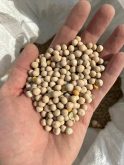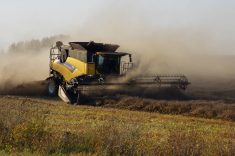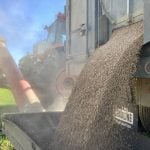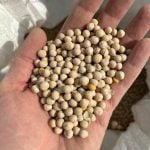Ontario’s corn and soybean growers’ group says it’s insulted and disappointed to find out the provincial ag ministry plans to put new limits on the use of neonicotinoid pesticides.
Grain Farmers of Ontario chairman Henry van Ankum said Monday the association is “extremely disappointed” to learn through the media — specifically, an article Sunday on the Globe and Mail’s website by reporter Eric Atkins — of incoming Agriculture Minister Jeff Leal’s plans, which may include a licensing system for future use of such products.
Leal was quoted in Atkins’ article as saying the ag ministry (OMAFRA) is “committed to working with stakeholders to develop a system that targets the use of neonicotinoid-treated seed only to areas or circumstances where there is demonstrated need.”
Read Also

Pulse Weekly: No upside for peas until after New Year
Prices for green and yellow peas have dropped back across the Prairies over the last week. One of the major downward drivers was the Statistics Canada production report released earlier this month, said Levon Sargsyan of Johnston’s Grain in Calgary.
Seed treatment of corn and soybeans with “neonic” insecticides, such as clothianidin, thiamethoxam or imidacloprid, has been blamed in part for declining populations of pollinators such as bees in areas where they may be exposed to dust from planters.
In a separate email statement Monday, Leal said he’s “committed to finding a balanced approach, based in science, that addresses the important role both pollinators and growers play in Ontario’s agri-food industry.”
In coming months, he said Monday, “I want to first consult with industry, farmers and environmental stakeholders on options that are practical, including the consideration of a license system” for neonic use.
The provincial government’s intention, he said, “is to move away from the widespread, indiscriminate use of neonicotinoid-based pesticides.”
“Counterintuitive”
Grain Farmers of Ontario, which represents the province’s corn, soybean and wheat growers, said in a separate release Monday that the province’s grain industry “has committed extensive resources over the past two years to mitigate the risk to bees.”
Many such initiatives “have been launched and put into practice this growing season and the results of ongoing research projects and in-field practices will be paramount in determining any future regulatory decisions,” GFO said. “It is counterintuitive to implement a regulatory change without the completion of this research and trials.”
“The effort and leadership grain farmers have demonstrated on this issue has been second to none, and to have this discounted with such a rash move and announcement through media, is frankly insulting,” GFO chair Henry Van Ankum said in the same release.
Growers have modified their planting equipment, are taking part in field trials and are using Bayer CropSciences’ “Fluency Agent” in cases where seed flow lubricants are needed to plant treated seed, he said. The Bayer product, now the only allowed lubricant, “has proven successful” in limiting neonic-laden dust, he added.
Growers, he said, have also “forged good, open communications with many beekeepers — we have a lot to share with Minister Leal and have not yet had the opportunity.”
Farmers across the province are also “shocked by the manner this announcement was made,” GFO added Monday, noting it’s “extremely disappointed that Minister Leal did not take the time to consult the organization as there will be negative financial impact to Ontario’s corn and soybean farmers and the grain industry as a whole.”
GFO said it’s always had a “good working relationship” with the provincial ag minister in years past but “this is not a good start.”
What Leal’s proposing, GFO said, is “a move against Canada’s science-based regulatory system” and noted Leal himself had recently written that the province “must continue to ensure decisions are balanced and based in science.”
Leal, in his statement Monday, said he “look(s) forward to hearing the perspectives of experts and stakeholders.” — AGCanada.com Network















